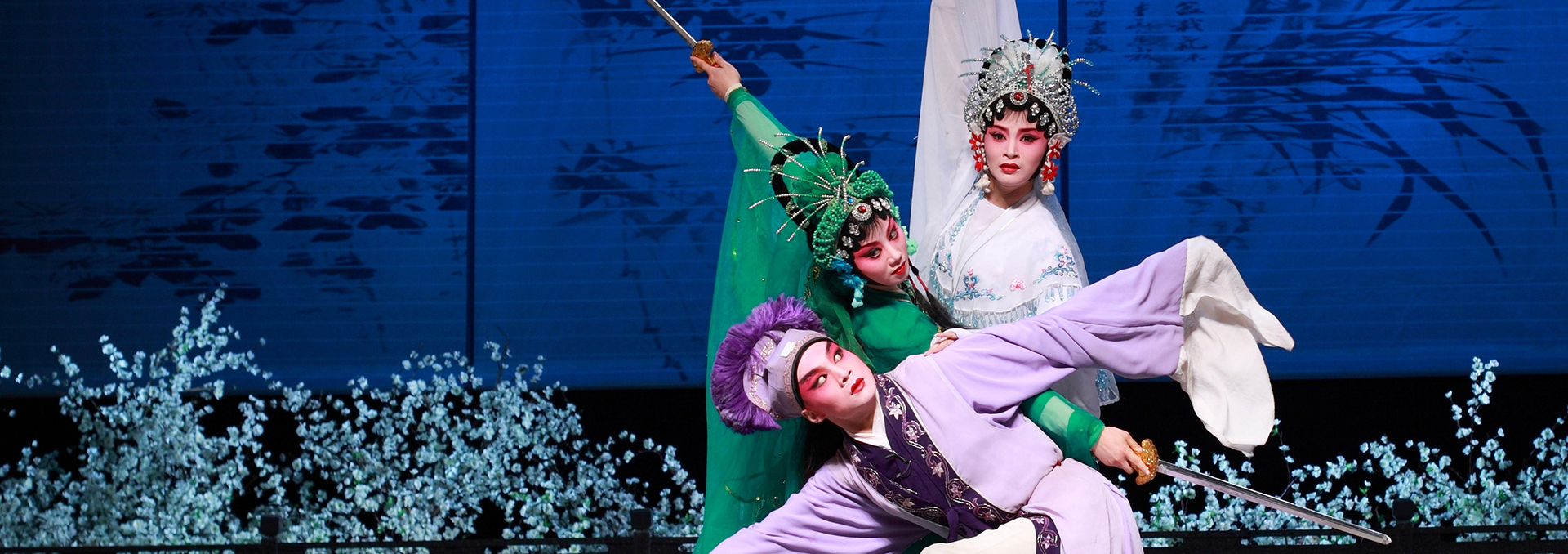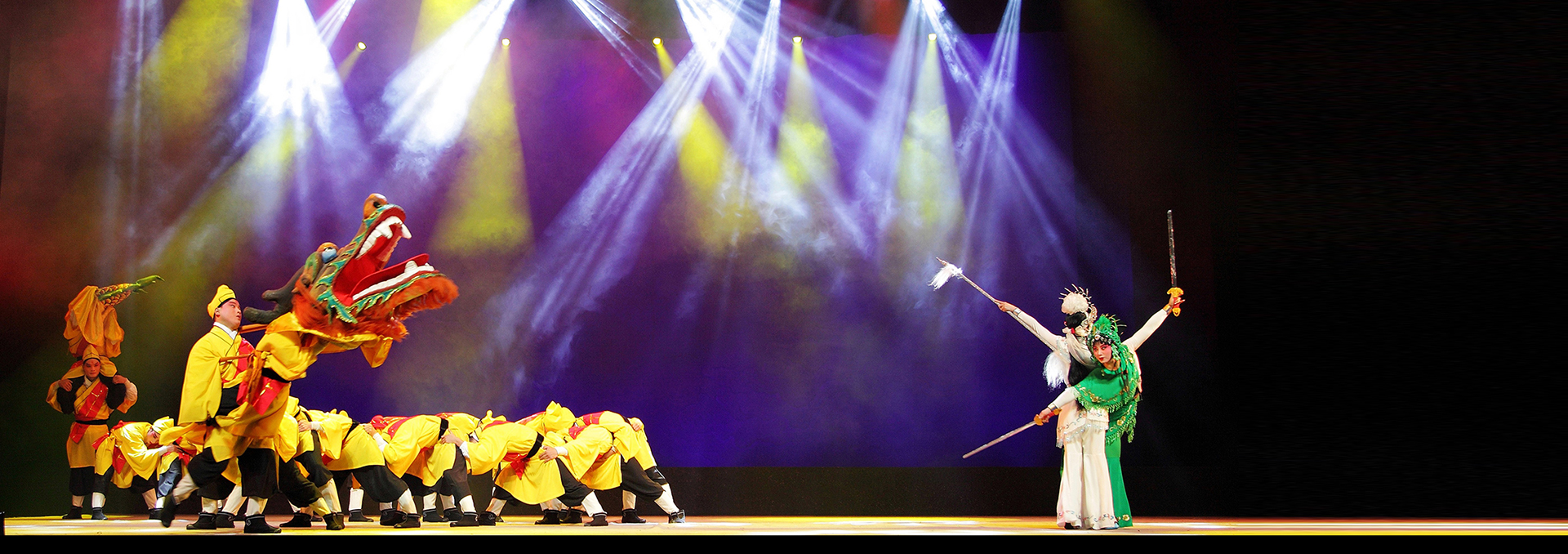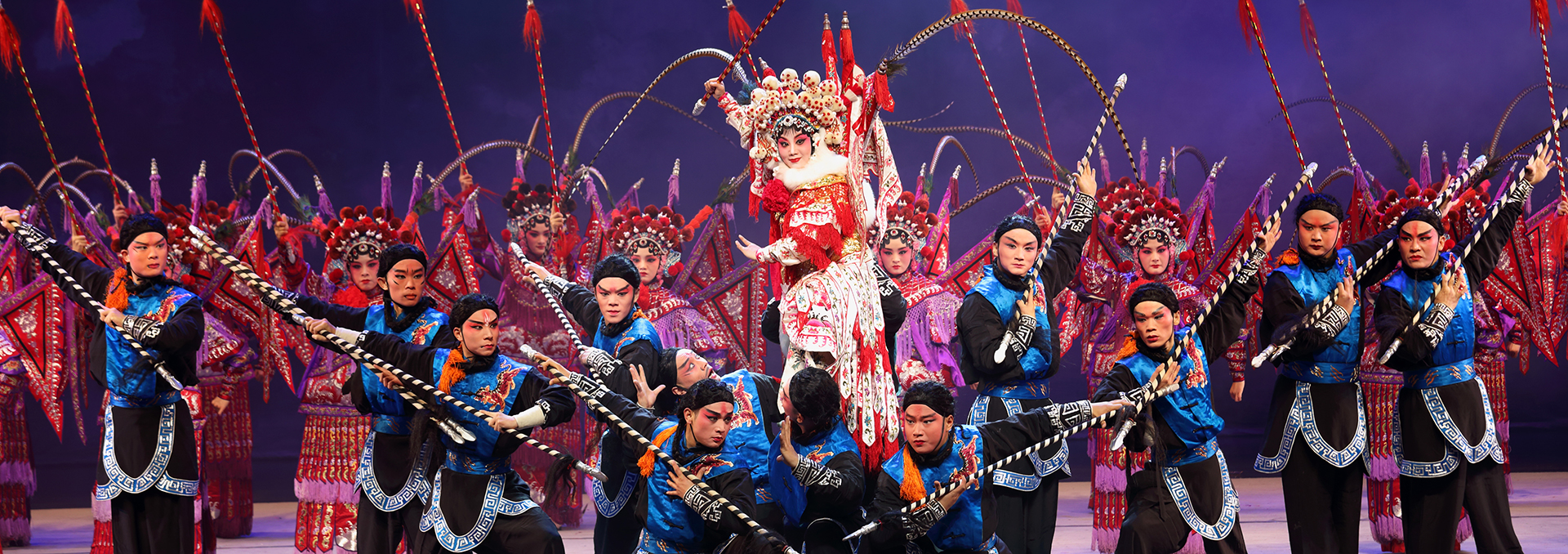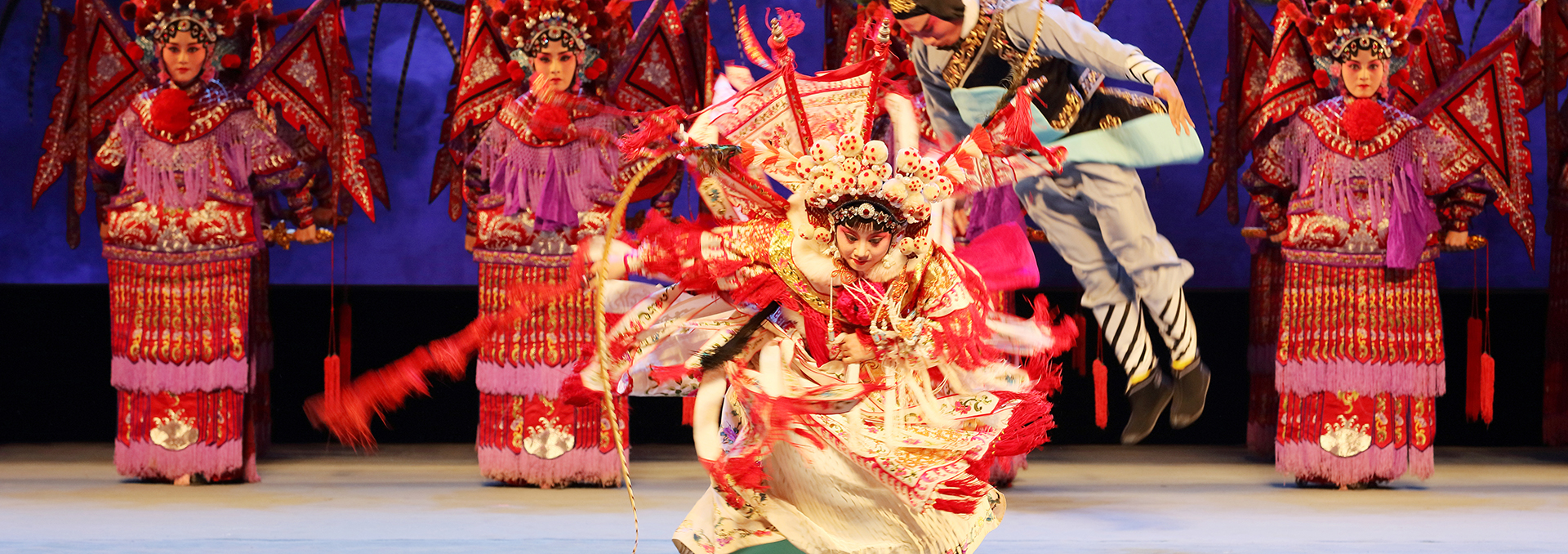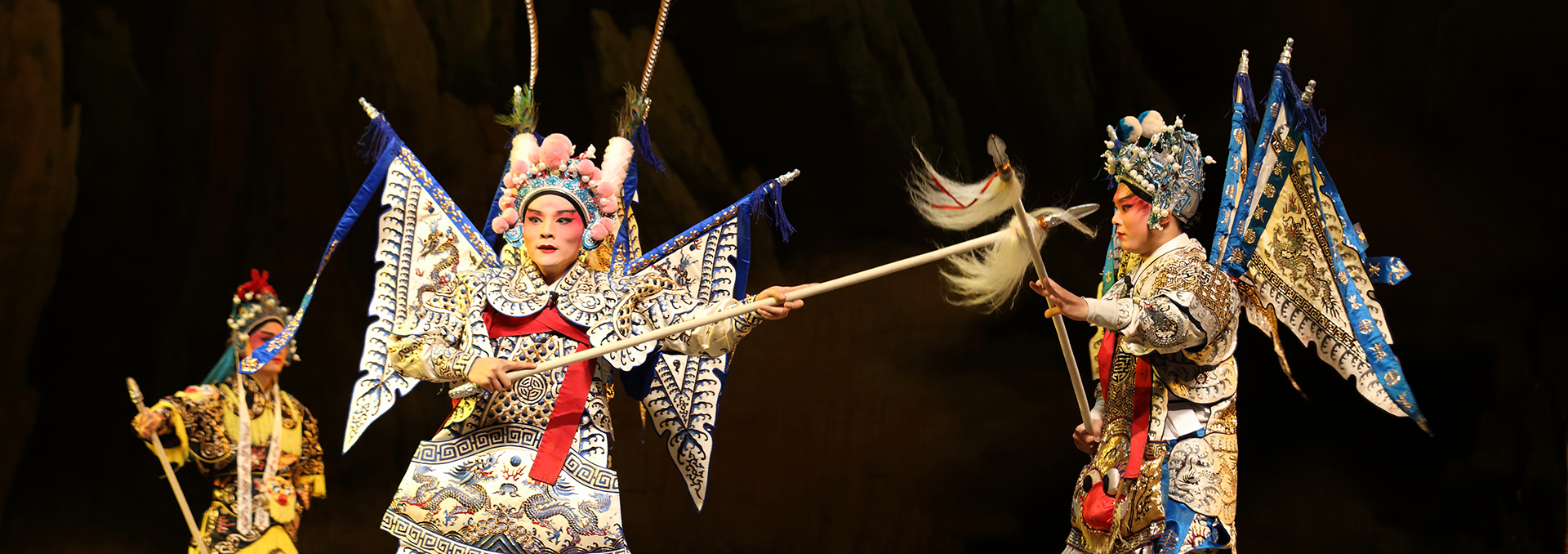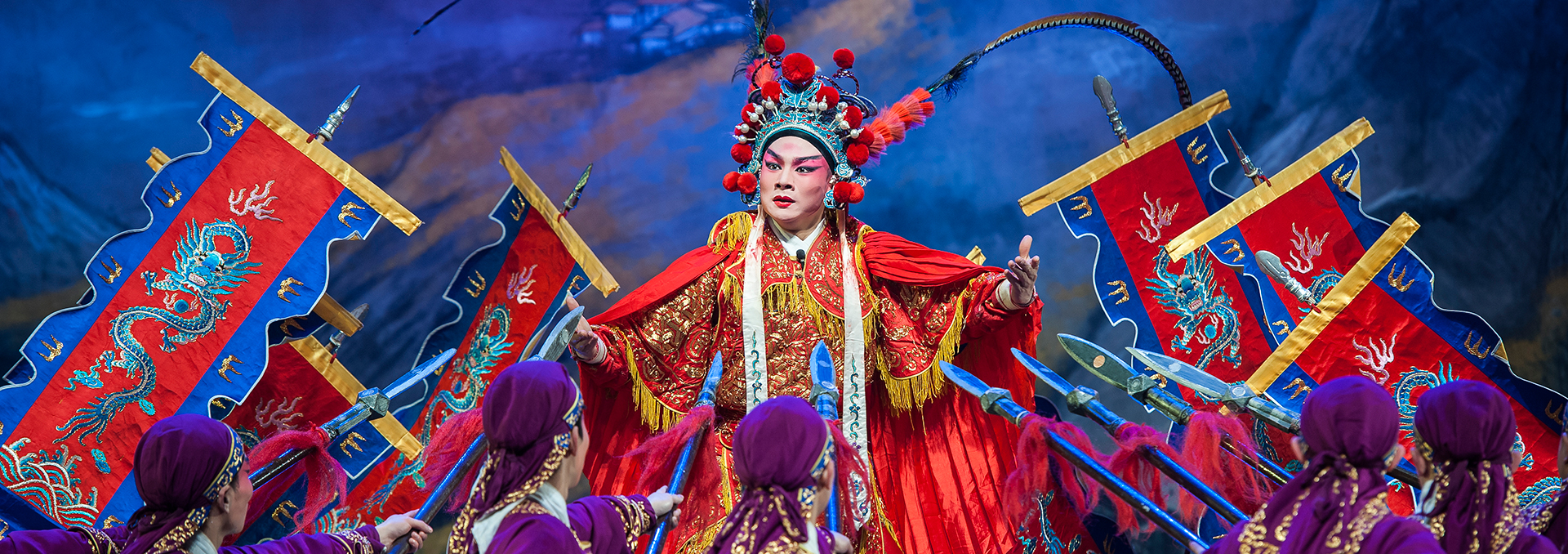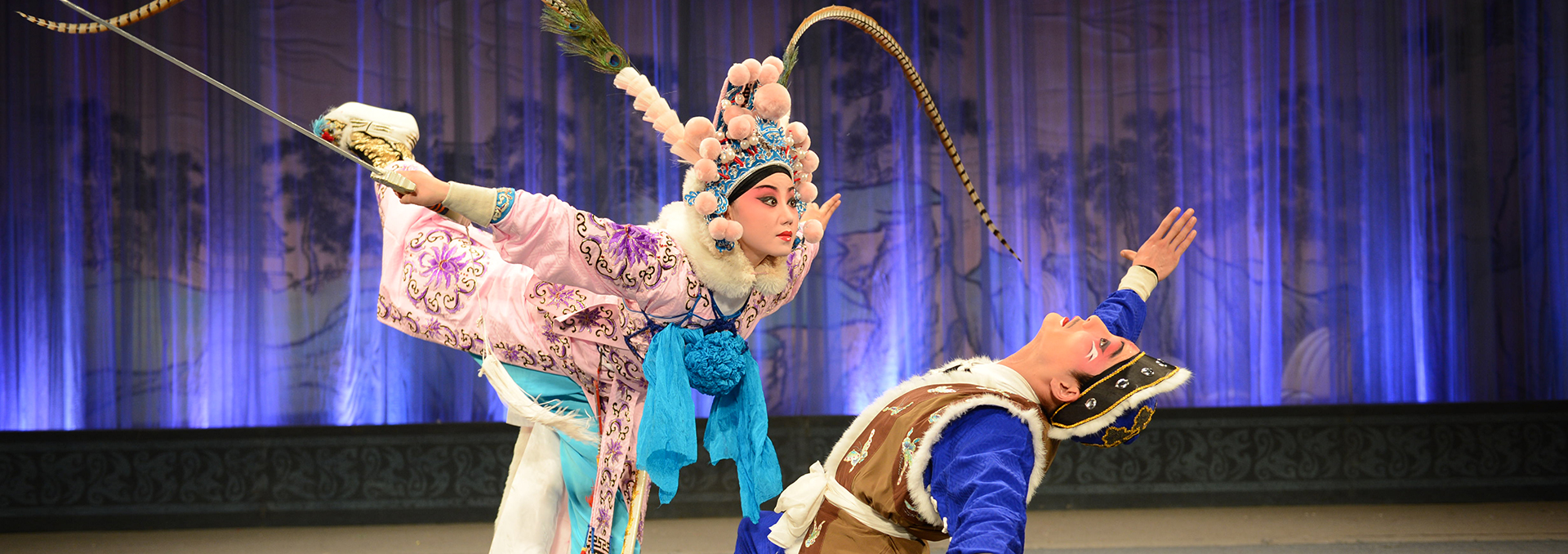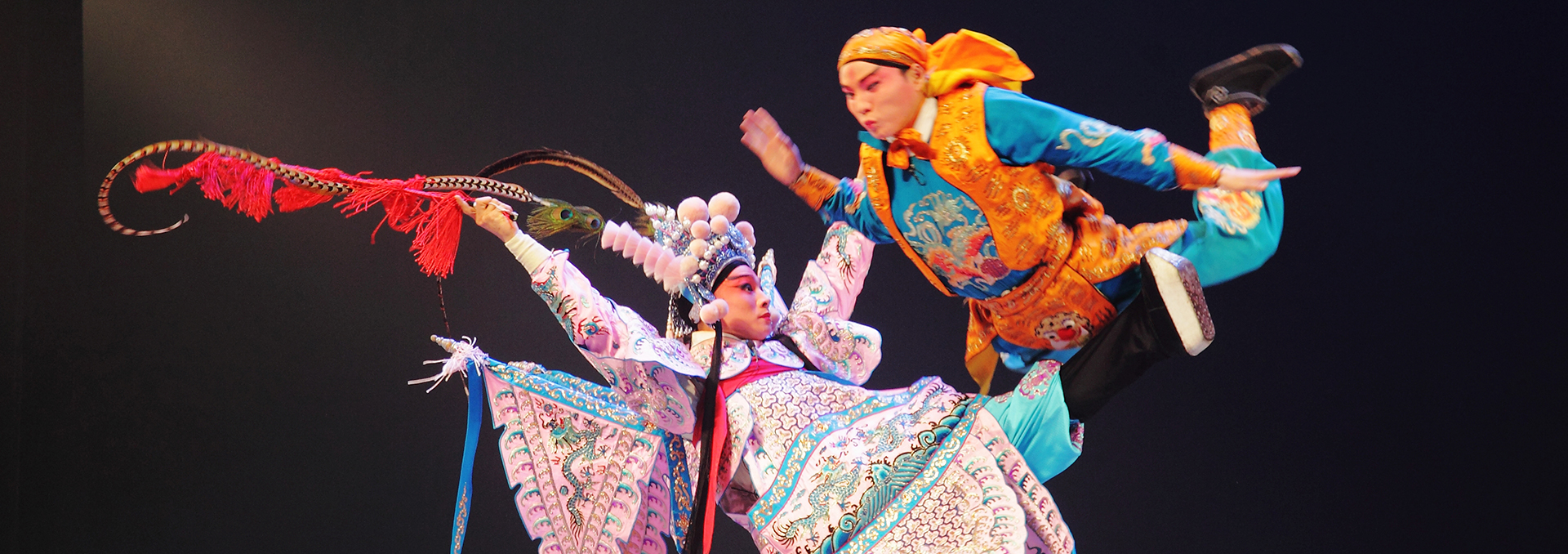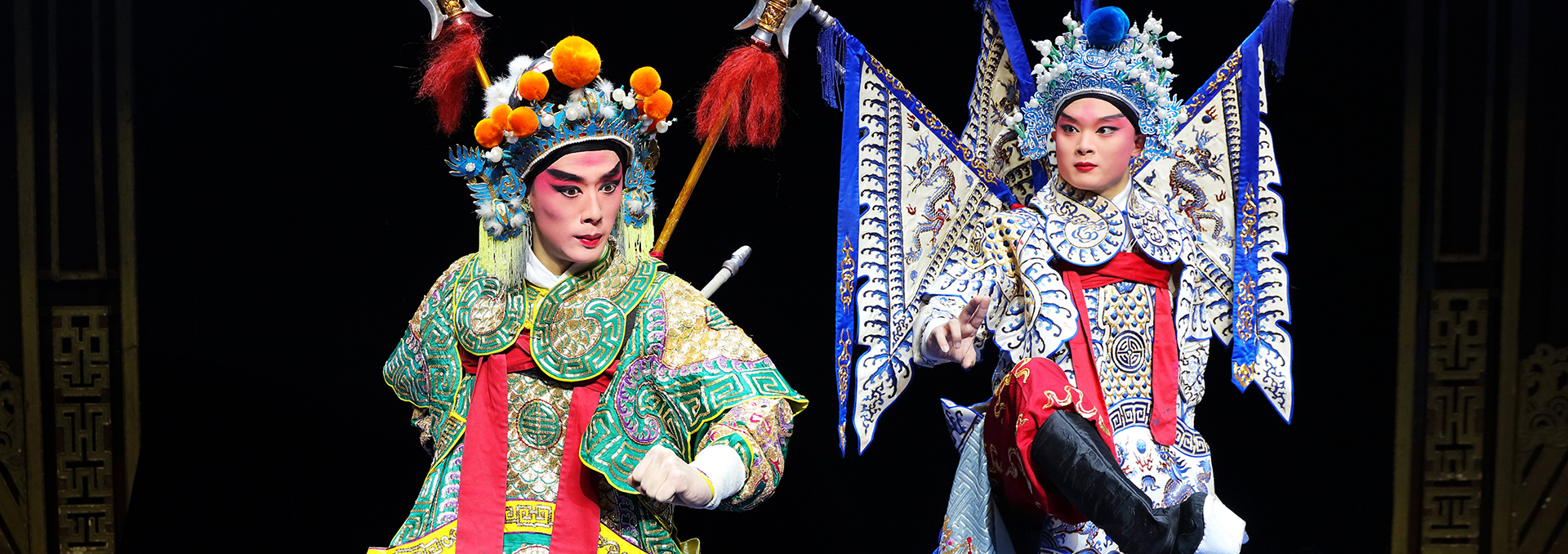
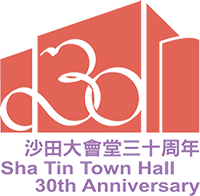

Zhejiang Wu Opera Research Centre
Introduction
Wu Opera is a major regional genre in the province of Zhejiang. It is popular in the catchment of Jinhua district, which is why locals call it Jinhua Opera. Wu Opera is a hybrid of six singing styles from different traditional genres: gaoqiang, kunqiang, luantan, huixi, tanhuang and shidiao. Wu Opera performers are all highly skilled in martial arts. As they are versatile in both civil and martial elements, their performances can demonstrate boldness and tenderness at the same time, the line between civil and martial repertoires is often crossed – civil sequences may be played with martial acts, and marital segments could be sung instead. Artistically, Wu Opera is distinctly colourful, vivacious, intense and rustic. Performers are particularly good at playing dancing and martial scenes, highlighting the power of movements and strong emotions. Zhejiang Wu Opera Research Centre performed at the Chinese Opera Festival in 2013. Their brilliant performances were overwhelmingly received by the audience. Returning to Hong Kong with great fame, distinguished Wu Opera performing artists Yang Xiayun, Lou Sheng, Wu Wenling, etc. will be performing the classics of the Wu Opera repertoires. The full-length play Mu Guiying is an elaborate production that features superior martial skills. Other excerpts are performed with the traditional techniques and martial postures of Wu Opera. In Wang Ying Suffers Three Beatings, there is the water drinking stunt; in Burning Zidu Alive, there are face-changing tricks such as wiping and blowing, etc. The Broken Bridge from The Legend of the White Snake is a representative performance of adding martial touches to a civil style. The audience will unquestionably be thrilled by the “snake steps” of the White Snake and the Green Snake, added with Xu Xian’s “eighteen falls”.
Artistic Instructor: Chen Meilan


Zhejiang Wu Opera Research Centre
Programme Details
Auditorium, Sha Tin Town Hall
23/6 Fri 7:30pm
Excerpts
The Death of Zhou Yu
An Anhui play in the repertoire of Wu Opera, sung in the xipi vocal style.
Also known as Death at Baqiu. Zhou Yu makes plots to eliminate Guo but his true goal is to seize Xichuan and Jingzhou. Zhou’s plans are seen through by Kongming, who makes an ambush to defeat Zhou Yu. Zhou Yu coughs out blood and dies.
Cast
Zhou Yu: Tao Yongjing
Zhao Yun: Song Baoduan
Zhang Fei: Liu Fuming
Huang Zhong: Dong Guojian
Wei Yan: Chen Xingshun
Horse keeper: Zhao Kongjie
The Incident at White Water Beach
An Anhui play in the repertoire of Wu Opera, sung in the jinduzi vocal style. Famous for its staff routines and martial art sequences.
A segment from Tong Tian Xi, a story of the Ming dynasty. Xu Qiying is a bandit of the Ming dynasty with the nickname “green-faced tiger”. Xu leaves his abode and tours around. He is drunk and sleeps on a green stone stele. He is arrested by a soldier. The prefecture magistrate asks the deputy commander and his son Liu Renjie to bring the arrested to the capital city using a strong army. Learning about the news, Xu Peizhu, the sister of Xu Qiying, leads a group to rescue her brother. Xu Qiying breaks his handcuffs apart and brings down the government army. The scene is seen by tenant farmer Mo Yuqi (also named Shiyi Lang), but he does not understand the aspects of situation. He helps the government side to fight Xu Qiying. Xu Qiying is outnumbered and defeated. Mo Yuqi, on the other hand, is framed by the soldiers and sentenced to execution. Xu Qiying puts their grudges aside and saves Mo.
Cast
Mo Yuqi: Zhou Hongwei
Xu Qiying: Ge Yujie
Liu Renjie: Huang Xiaomin
Xu Peizhu: He Xiaole
Wang Ying Suffers Three Beatings
A luantan play in the repertoire of Wu Opera, sung in the bozi vocal style. A production with martial arts sequences, singing, gesturing and fighting elements. The group image is exceptionally styled.
Wang Ying and Yao Gang are both the descendants of decorated ministers, but both have fallen and become bandits. Knowing their country’s crisis, Wang Ying knows the right thing to do and goes to Mount Taihang and tells Yao Gang to stand up for his country. However, Yao Gang only remembers the feud of his family. He quotes an old vow that the Yao’s will never serve the Han dynasty and beats Wang Ying. Enduring physical pain, Wang Ying convinces Yao Gang with humour while suffering three beatings from Yao. Yao is moved in the end.
Cast
Wang Ying: Lou Sheng
Yao Gang: Wu Yanxing
-Intermission of 15 minutes -
Stopping the Horse
A luantan play in the repertoire of Wu Opera, sung in the bozi and luhua vocal styles. The sword-kicking, chair sequences and other techniques of Wu Opera have originated from this pioneering play.
Jiao Guangpu is a military commander of the Song dynasty. Stranded in foreign stage, he sells wine for a living and waits for the opportunity to return to his homeland. One day, a young soldier walks past his wine store. Jiao Guangpu lures him into the store and tries to steal his travel permit. After a round of combat, he finds out the young soldier is Yang Bajie in disguise. After clearing up the misunderstanding, Jiao Guangpu returns home with Yang Bajie.
Cast
Yang Bajie: Yang Xiayun
Jiao Guangpu: Tao Yongjing
The Eighteen Arhats Fighting with Wukong
A kunqiang play in the repertoire of Wu Opera, comprises martial art sequences.
After Sun Wukong wreaked havoc at the Heaven Palace, the Jade Emperor sends a hundred thousand of celestial soldiers to follow and capture the Monkey King. But they are no opponent for Wukong. Erlang Shen is therefore sent to assist with the battle. The Great Supreme Lord uses the Golden Jade Ring and defeats Wukong, taking the Monkey King to the heavenly borders. Since neither daggers nor axes can hurt Wukong, the Great Supreme Lord puts Wukong into his burner and heats him up. Wukong takes up the energy from the fire and gains powerful golden fiery eyes. After he jumps out of the burner, he laughs at the Great Supreme Lord. The Buddha sends the eighteen Arhats to fight with Wukong. They capture Wukong in the end.
Cast
Sun Wukong: Liu Jianyang
The running time of the performance is approximately 2 hours and 30 minutes including an intermission of 15 minutes.
Auditorium, Sha Tin Town Hall
24/6 Sat 7:30pm
Mu Guiying
A classic Anhui play in the repertoire of Wu Opera, mainly sung in the vocal styles of xipi, jinduzi and manduzi. The rustic and mellow charm of ancient Anhui plays is preserved in the melodies and singing styles.
Scene One The Encounter
In the Song dynasty, Xiao Tianzuo of the Liao state invades at the border and sets up the Tianmen battle formation. Yang Yanzhao and his sons fail to take down the enemies after a long-fought battle. Yang Zongbao is sent to Mount Wutai to bring Yang Wulang to the front line and help crush the opposition. When Yang Zongbao walks past the Mu’s Stockade, he meets Mu Guiying, the lady of the stockade who is leading courageous villagers on a military drill of formations on site. Yang Zongbao accidentally enters their formation and is captured by Mu Guiying.
Scene Two The Marriage
Mu Guiying plays a good host to the impatient Yang Zongbao. After learning each other’s origins and stories, the two begin to have mutual romantic feelings. Mu Guiying studied with her father about battle formations and military training since a young age and becomes a patriotic and tactic warrior. She points out to Yang Zongbao the secret tricks to break the Tianmen battle formation apart and draws him a plan. Yang Zongbao is overjoyed and asks Mu to leave the stockade with her village troop and help the Song camp in taking the Tianmen battle formation apart. But Mu intends to marry Zongbao first. Zongbao cannot resist.
Scene Three The Confrontation
Learning that his son is captured into a stockade, Yang Yanzhao leads his soldiers onto a midnight mission to rescue Zongbao. Yang Yanzhao is however defeated by Mu Guiying and returns in embarrassment. The next morning, Yang Zongbao returns to the camp. Yang Yanzhao is angry and hurt to find out Zongbao has married at the stockade. After some contemplation, Yang Yanzhao does not give Yang Zongbao the chance to explain the matter but command to execute Zongbao at the front gate. Yanzhao believes this is the perfect plan – he can draw the attention of Mu Guiying to save Zongbao and Mu can help them fight their opponent troop.
-Intermission of 15 minutes -
Scene Four The Execution
Meanwhile, Madam She and the Eighth Prince are sent by the Emperor to deliver food to reward the army. Seeing that her grandson is to be executed, Madam She rushes to the tent and demands pardon for Zongbao. She also blames her son for being too harsh. The mother and son argue. The Eighth Prince understands what is going on and convinces Madam She to rest in another tent and wait for some talented person to rescue Zongbao. Soon after, Mu Guiying arrives and sees her groom about to be executed at the front gate. She is shocked and rushes to the commander’s tent. Yanzhao and Guiying spar with each other. In the end, Mu Guiying gives the plan to break the Tianmen battle formation and Yang Zongbao is released. The couple join up to fight their enemies.
Scene Five The Victory
After a series of meticulous training, Mu Guiying takes up the role of the commander and takes the Tianmen battle formation apart. She defeats Xiao Tianzuo, suppresses the enemies and returns in triumph.
Cast
Mu Guiying: Yang Xiayun
Yang Zongbao: Lou Sheng
Yang Yanzhao: Chen Jianxu
Madam She: Gao Qian
The Eighth Prince: Li Xuanyu
Jiao Zan: Jiang Yaohong
Meng Liang: Wang Guangming
Mu Gua: Chen Xiaojian
Xiao Tianzuo: Jiang Weiqiang
Horse keeper: Liu Fuming
The running time of the performance is approximately 2 hours and 30 minutes including an intermission of 15 minutes.
Auditorium, Tuen Mun Town Hall
25/6 Sun 7:30pm
Excerpts
Lu Bu Pacing His Horse
A kunqiang play in the repertoire of Wu Opera. The stylised movements of actors, blanket sequences and other martial arts skills that match with the plotline are combined to showcase the extraordinary dexterity and superior foundation skills of the cast.
During the Three Kingdoms period, military commander Lu Bu is thrilled to receive a precious horse that can make very long distance each day. He brings his team to the countryside to try out the power of the precious horse, but the horse is born wild and difficult to tame. With his militant pride and superior riding skills, Lu Bu subdues the horse and returns to camp in delight.
Cast
Lu Bu: Lou Sheng
Meng Jie: Tao Yongjing
Burning Zidu Alive
A traditional Anhui play in the repertoire of Wu Opera, mainly sung in the vocal styles of xipi, fanxipi and jinduzi, etc. In terms of the theatrical presentation, it features both singing and gesturing. Face changing skills, such as mopping and blowing dust, that are unique to Wu Opera are played to their fullest in this production.
The states of Zheng and Xu are at war. Chief commander Ying Kaoshu is to lead the first fight. Wanting to be the leader of a triumphant win, Ying’s deputy Zidu ignores his commands and dashes into the battlefield, running into danger as the Xu army attacks them with fire. Luckily, Ying Kaoshu comes to Zidu’s rescue. As the army rejoices and returns to the capital city, the narrow-minded Zidu kills Ying Kaoshu, intending to take credit for the victorious war. Yet, he is scared by the tiniest signs day in and day out. At the celebratory banquet, Zidu is not himself – he falls into a trance and hallucinates. He thinks Ying Kaoshu is angrily blaming him and trying to take his life. All of sudden, Zidu’s breaks down and kills himself in great fear and guilt.
Cast
Gongsun Zidu: Huang Xiaomin
Duke Zhuang of Zheng: Chen Jianxu
General Gongsun: Jiang Weiqiang
Ji Zu: Li Xuanyu
Shenting Ling
An Anhui play in the repertoire of Wu Opera, sung in the jinpi vocal style and comprises martial art sequences.
Also known as The Youth’s Oath, the story comes from Taishi Ci Fights with The Little Conqueror, Chapter 15 of Romance of the Three Kingdoms. To collect military intelligence about Liu Yao, Sun Ce is bringing only 13 men as he rides up to Shenting Ling. He enters Guangwu Temple to burn incense and perform rituals. Taishi Ci is a brave and tactical battalion commander of Liu Yao, but he declines the order of Liu and leads his own troop to leave camp to fight with Sun Ce. Sun and Taishi keep fighting as they descend from the mountain; they also fight on and off the horseback. Eventually, they give up their weapons and engage in fist fight. Unable to tell who is winning, Sun and Taishi fight until their armours are ripped into pieces. Troops are only sent back when the sun is about to set and a storm is approaching. Liu Yao loses his big fight with Sun Ce, and Taishi Ci cannot hold up on his own. Taishi Ci sends some ten chivalries to Jing County for backup support. Sun Ce sets off for the battle, capturing and killing Yu Mi and Fan Neng by force. Since then, everyone calls Sun Ce the Little Conqueror. Sun Ce likes Taishi Ci and makes plan with Zhou Yu to win Taishi Ci over to his side.
Cast
Taishi Ci: Zhou Hongwei
Sun Ce: Song Baoduan
Zhou Yu: Chen Jianxu
Zhang Yong: Jiang Weiqiang
-Intermission of 15 minutes -
Shaving His Hair, Flooding Jinshan Temple & The Broken Bridge from The Legend of the White Snake
The Broken Bridge is a representative civil title performed with martial techniques in Wu Opera, and has been reputed as a play that exhausts the singing skills of the White Snake, the gesturing skills of the Green Snake and the falling skills of Xu Xian. The "snake steps” and “snake’s form” of Madam Bai and Xiaoqing demonstrate the essential dance of snakes combined with human moves. The “eighteen falls” of Xu Xian, on the other hand, bring out the rustic and powerful style of Wu Opera. The three main characters are vividly styled and dressed, as if they are magnificent statues brought to life.
Xu Xian visits Jinshan Temple to pay his votive gratitude. The monk Fahai insists that Xu Xian should become a monk and forbids him to leave the temple. Bai Suzhen comes to the temple to beg for the return of her husband to no avail; she is insulted instead. Suzhen and her maid Xiaoqing have no other way but to use their magical powers by pouring the water of Yangtze River to bring a flood to Jinshan Temple. Fahai summons the help of celestial soldiers to keep the temple safe. After an arduous fight, the pregnant Madam Bai loses. She and Xiaoqing make their way back to Hangzhou and arrive at the West Lake and run into Xu Xian, who just managed to escape from Jinshan Temple. Xiaoqing is furious and intends to kill Xu Xian. Feeling extremely guilty, Xu Xian begs for Suzhen’s forgiveness. Suzhen has very mixed love and hate feelings – she tries to calm down Xiaoqing on one hand and scolds Xu Xian for his heartlessness on the other. Xu Xian vows to pledge his love. The couple set their grudges aside and make peace.
Cast
Bai Suzhen: Wu Wenling
Xiaoqing: Yang Xiayun
Xu Xian: Lou Sheng
Fahai: Li Xuanyu
The running time of the performance is approximately 2 hours and 30 minutes including an intermission of 15 minutes.
Information provided by Zhejiang Wu Opera Research Centre


Zhejiang Wu Opera Research Centre
Genre
Wu Opera
Wu Opera is the second major regional operatic genre of Zhejiang. It is also known as Jinhua Opera because it first grew in popularity in Jinhua and its environs of Quzhou, Lishui, Taizhou and Jiande in Zhejiang, and extending to Jindezhen in Jiangxi. In terms of vocal style, it is a hybrid of Gaoqiang, Kunqiang, Luantan, Huixi, Tanhuang and Shidiao. But in the main, it uses Luantan as the basis, so it belongs to the Luantan system and provenance, and therefore has a history of more than four hundred years. It is distinguished by its liveliness, particularly in the adept use of martial arts and dance to express strength of movement and emotions, characteristically “crossing the line between the martial and the civil repertories”. The music is high-flung, sonorous in tone, brisk and crisp, with a repertory covering a wide range of subject matters that reflect the life of the common folks and tell of the legendary figures in Chinese folklore.


Zhejiang Wu Opera Research Centre
Performing Group
Zhejiang Wu Opera Research Centre
Founded as Zhejian Wu Opera Theatre Company in 1956, the centre has been actively reviving and exploring the traditional art of Wu opera. The company has since collated more than 800 plays and 3,000 sung tunes and set tunes; the traditional masks and costumes unique to Wu opera have also been documented. The company has created and performed a number of distinguished plays, including The Gold Seal, The Story of Rice-giving, Thrice Begging Fan Lihua, Plum Blossom in Snow, The Broken Bridge, The Meeting between the Monk and the Nun, etc. Illustrious and influential actors such as Xu Dongfu, Zhou Yuexian, Xu Ruying, Zhou Yuegui, Zheng Lanxiang, Wu Guangxu, Ge Suyun, Yan Zonghe all played for the company. Renowned actors have also been trained by the company, including Chen Meilan, Zhang Jianmin, Zhao Shushu, Zhu Yuanhao, Zhou Zhiqing, Miao Nen, Tong Zhigang, Liu Zhihong, Huang Weilong, etc. Amongst them, Chen Meilan is a two-time winner of the Plum Blossom Award for Chinese Theatre. Many of the company’s productions were awarded in the national Chinese opera showcase. Their performances have also been staged in numerous countries and locations across Europe and Asia.


Zhejiang Wu Opera Research Centre
Production Team
Company Director: Wang Xiaoping
Deputy Director: Zhu Yuanhao, Lou Xiaohua
Assistant Leader: Li Ruilong
Executive Director / Artistic Adviser: Chen Meilan
Stage Manager: Lou Xiaohua
Administration: Bu Annie Ka-man
Cast: Yang Xiayun, Lou Sheng, Wu Wenling, Tao Yongjing, Wu Yanxing, Song Baoduan, Dong Guojian, Chen Xingshun, Zhou Hongwei, Ge Yujie, He Xiaole, Chen Jianxu, Li Xuanyu, Gao Qian, Jiang Yaohong, Wang Guangming, Chen Xiaojian, Huang Xiaomin, Jiang Weiqiang, Zhao Kongjie, Liu Fuming
Musicians
Drum: Jiang Quanqing
Percussion: Zhou Zhaoliang, Chen Zhipeng, Ji Huan
Lead Huqin: Du Xiangjun
String Instrument: Wu Linglin, Feng Jingwei, Chen Manli
Plucked Instrument: Zhu Feifei, Wu Lihua, Jin Huikang
Wind Instrument: Chen Jiancheng, Yan Jianglei
Bass: Zhu Jianfeng, Jiang Shaohua
Zhonghu: Yao Hengxing
Stage Art Team
Stage Art Design: Zhu Xiaobao
Stage Art Operation: Ni Jianwei, Gao Jianshen, Fu Wenbin
Lighting Design: Fan Xianwei
Stage Installation: Shi Qingping
Sound Operation: Wang Xiaojun, Zhou Hang
Co-ordinator and Planning: Shanghai Opera Association (H.K.)
House Programme Information and Surtitles Translation: Multilingual Translation Services


Zhejiang Wu Opera Research Centre
Ticketing
Auditorium, Sha Tin Town Hall
23-24/6 Fri-Sat 7:30pm

 $380
$380  $300
$300  $220
$220  $150
$150
Auditorium, Tuen Mun Town Hall
25/6 Sun 7:30pm

 $340
$340  $280
$280  $220
$220  $150
$150
With Chinese and English surtitles
Please refer to the "Extension Activities" page for details of extension activities
Programme Enquiries: 2268 7325
Ticketing Enquiries: 3761 6661
Credit Card Telephone Booking: 2111 5999
Internet Booking: www.urbtix.hk
Please click here for discount scheme details.

